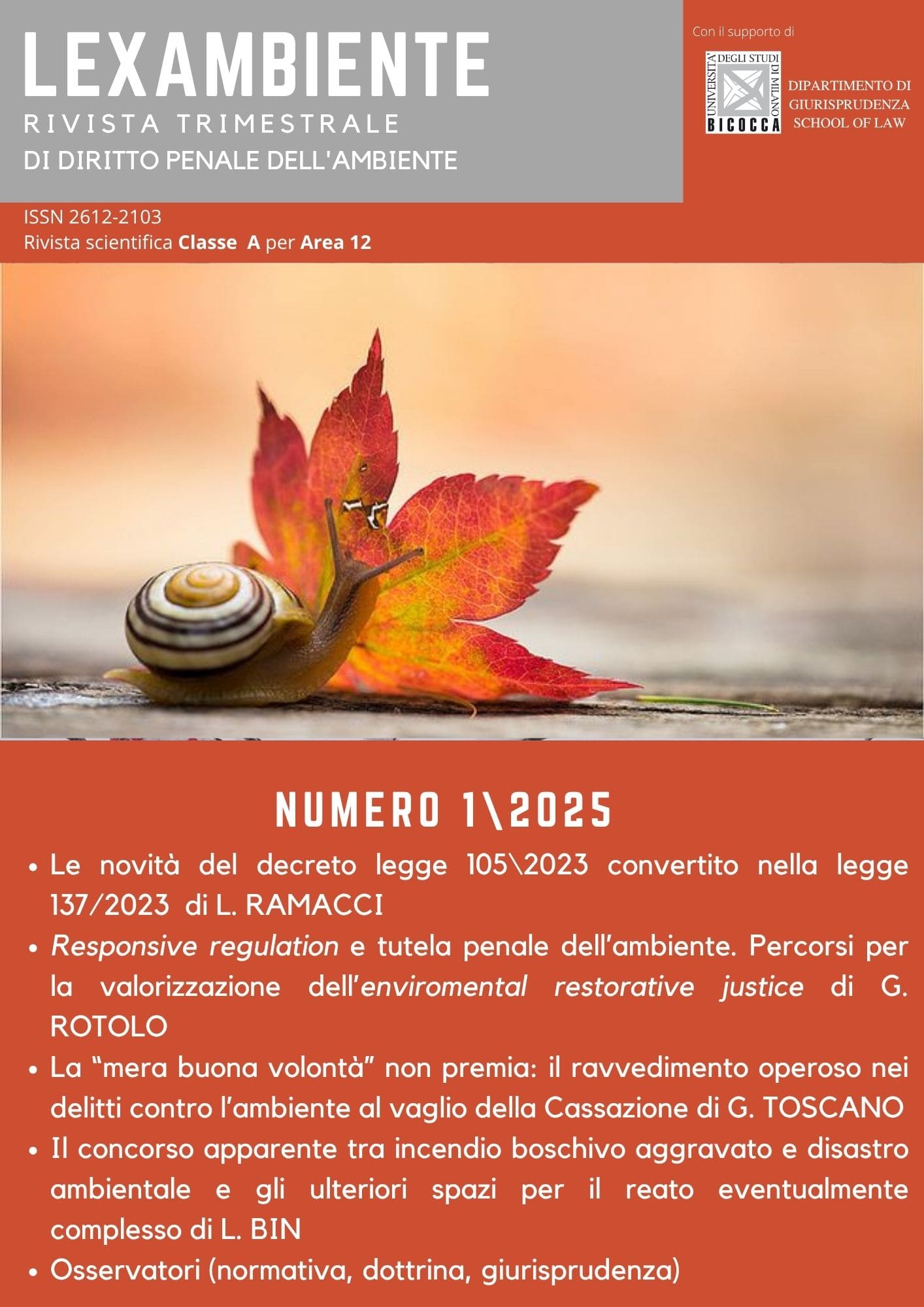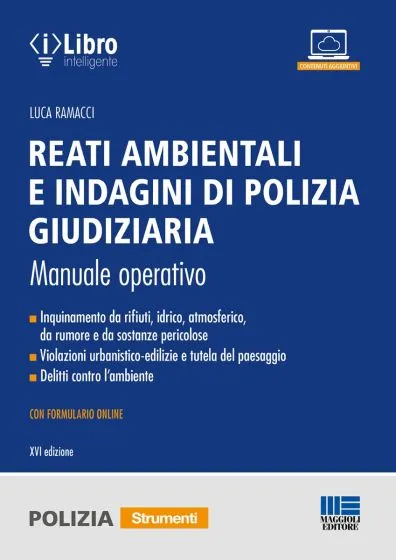DUTIES OF THE SCIENTIFIC DIRECTORATE
Decisions on publication
The Scientific Direction of the journal is responsible for the decision to publish or not the proposed articles according to the editorial line of the journal and the purposes of the same, in compliance with current legislation.
The Scientific Direction takes its decisions after a double blind peer review has been carried out by the members of the Scientific Committee and the Reviewers, who have specific competences in environmental criminal matters.
Correctness
The members of the Scientific Committee and the Reviewers evaluate the articles proposed for publication on the basis of their content without discrimination of race, gender, sexual orientation, religion, ethnic origin, citizenship, political orientation of the authors.
Confidentiality
The members of the Scientific Committee and the Reviewers and the Editorial Board undertake not to disclose information on the proposed articles to anyone other than the author, the Scientific Direction and the publisher.
Conflict of interest and disclosure
The members of the Scientific Committee and the Reviewers undertake not to use in their own research the contents of an article proposed for publication without the written consent of the author.
DUTIES OF THE PEER REVIEWERS
Contribution to the editorial decision
Peer-review is a procedure that helps editors make decisions about proposed articles and also allows the author to improve his or her contribution.
The review aims to ensure the best possible quality of the journal and, for this reason, it is carried out by the members of the Scientific Committee and the Reviewers identified according to their specific scientific expertise but also ensuring an adequate rotation.
Respect for time
The reviewer who does not feel adequate to the proposed task or who knows that he or she cannot carry out the reading within the required time is required to promptly notify the Editorial Board or the Scientific Directorate.
Confidentiality
Any text assigned in reading shall be considered confidential.
Therefore, these texts should not be discussed with other persons without the express permission of the editors.
The contribution to be evaluated is sent to the reviewers without indicating the name of the author and without providing any indication that would allow their identity to be identified.
The names of the reviewers should also remain confidential.
Objectivity
The review must be conducted objectively.
Any personal judgement on the author is inappropriate.
The auditors, after the outcome of the audit, will draw up an appropriate evaluation form in which they will have to express their opinion on the article in relation to the following parameters:
1) Structure (coherence and clarity of the logical system);
2) Legal and jurisprudential references (if required by the type of contribution);
3) Academic references;
4) Language style;
5) Critical argument
Each parameter must be independently evaluated, indicating the outcome (insufficient/sufficient/good or more) and then expressing an overall final judgement.
The reviewers, if they deem it appropriate, may, in the case of a positive evaluation, suggest further specific review on the work in order to improve it; in the case of a negative evaluation, however, they should advise the Author on drafting an acceptable version of the work.
The evaluation sheet and the documentation relating to the review process for each contribution is kept by the Editorial Board.
Referencing texts
The reviewers undertake to indicate precisely the bibliographic references of fundamental works that may have been overlooked by the author.
The reviewer must also inform the editors of any similarities or overlaps between the text received for reading and other works known to him or her.
Conflict of interest
Reviewers are required not to accept articles for which there is a conflict of interest resulting from relations of competition, collaboration, or other type of connection with the authors, companies or bodies that have a relationship with the subject of the manuscript.
DUTIES OF THE AUTHORS
Access to and retention of data
If the Scientific Directorate deems it appropriate, the authors of the articles should also make available the sources or data on which the research is based, so that they can be kept for a reasonable period of time after publication and possibly made accessible.
Originality and plagiarism
The authors must guarantee the originality of the work and declare that they have cited all the texts used.
Multiple, repetitive and/or competing publications
The proposed manuscripts must not have been published as copyrighted material in other journals.
Manuscripts under revision by the journal should not be submitted to other journals for publication.
Referencing of sources
The author must always provide the correct references for the sources and contributions mentioned in the article.
If used, the work or words of other authors should be quoted literally or paraphrased indicating the source and author.
Autorship of the work
The literary authorship of the manuscript is limited to those who have made a significant contribution to the conception, design, execution or interpretation of the study.
All those who have made a significant contribution should be listed as co-authors.
If there are other individuals who have participated in substantial aspects of the research project, they should be recognized and listed as contributors in the acknowledgements.
The corresponding author must ensure that all relevant co-authors are included in the manuscript, that they have seen and approved the final version of the manuscript and that they agree to its submission for publication.
If the article has been accepted, the author, who retains the copyright, grants the publisher the right to the first publication, authorizing all the modalities of use provided in the editorial license adopted by the journal (CC-BY-NC).
Conflict of interest and disclosure
All authors are required to state explicitly that there are no conflicts of interest which might have affected the results obtained or the interpretations proposed. Authors must also indicate any funding bodies for the research and/or the project from which the article is derived.
Contributions (notes, articles commenting analytically on certain judgements) from authors involved as lawyers or judges in cases referred in the article are not allowed.
Moreover, the publication of opinions produced or intended for judicial proceedings is not allowed.
Errors in published articles
When an author identifies a significant error or inaccuracy in an article, he or she is required to inform the editorial board in good time and to provide all the information necessary to report any necessary corrections at the end of the article.





